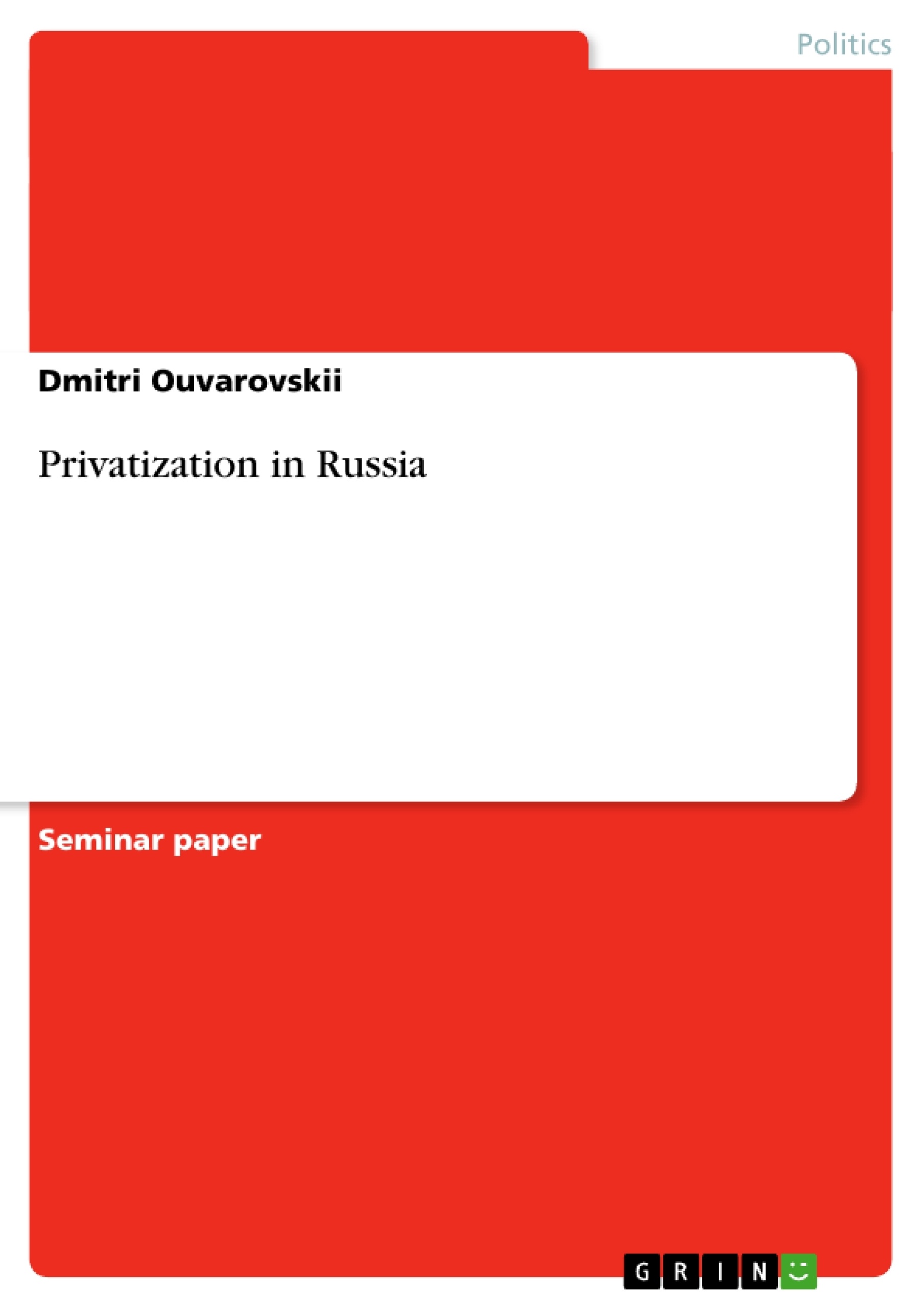Fragmentation of state authority, lack of a clear legislative base, unreliability of the legal system, collapse of the industry, bisection of the GDP, runaway inflation, capital flight, rises in crime and corruption, tremendous decline in life expectancy: the political, economic and social results of Russia’s transition from plan to market under Yeltsin are devastating. Within a few years the “mighty” Soviet Union fell back from a major power to a third world economy, dealing with problems like mass poverty and epidemics.
In light of these disastrous outcomes the question of what “went right” during the transition process seems to be even more appropriate then the question of what “went wrong”. However, while it seems to be obvious that the stabilization and liberalization attempts by the Russian government predominantly failed, privatization, the third core facet of transition1 , “has been touted as a one of the major successes of the Russian government’s economic transformation policy. By the beginning of 1996 77.2% of medium-size and large enterprises had been privatised, accounting for 88.3% of total industrial output.”2 On the one hand, according to the Russian government’s Western advisers this privatization is the fastest in
human history and “seems to be one of the few positive fruit of Russian economic policy since 1991”3. On the other hand, a common point of view is that its implementation led to an unfair distribution of state assets and only benefited a minority of Russian population. This debate is going to be the main focus of this paper. By discussing the general importance of the private sector to a democracy, the aims of privatization, its subsequent reforms, and its results, I intend to assess the contribution of these reforms to the process of Russian democratization.
Inhaltsverzeichnis (Table of Contents)
- Introduction
- Democracy, Market Economy and Privatization
- Soviet Legacy
- Gorbachev's Economic Modernization
- Privatization under Yeltsin
- The Opposition
- Impacts on the Democratization Process
Zielsetzung und Themenschwerpunkte (Objectives and Key Themes)
This paper examines the process of privatization in Russia and its contribution to the democratization process. It explores the goals, reforms, and outcomes of privatization, focusing on the period between 1991 and 1997 under the Yeltsin administration.
- The relationship between democracy, market economies, and privatization.
- The impact of the Soviet legacy on economic reforms.
- The goals and implementation of privatization under Yeltsin.
- The challenges and controversies surrounding privatization in Russia.
- The contribution of privatization to the democratization process in Russia.
Zusammenfassung der Kapitel (Chapter Summaries)
- Introduction: This chapter sets the stage for the discussion by outlining the devastating political, economic, and social consequences of Russia's transition from a planned economy to a market economy. It introduces the central question of what went right during the transition process, particularly focusing on the success of privatization.
- Democracy, Market Economy and Privatization: This chapter examines the theoretical relationship between democracy, market economies, and privatization. It argues that a strong private sector is crucial for economic growth and stability, which in turn supports democratic institutions.
- Soviet Legacy: This chapter explores the impact of the Soviet command economy on the transition process. It discusses the inefficiencies and distortions inherent in the Soviet system, as well as the rise of a shadow economy and a powerful nomenklatura.
- Gorbachev's Economic Modernization: This chapter examines Gorbachev's attempts to introduce economic reforms within the existing Soviet system. It highlights the challenges he faced, the limited scope of his reforms, and the introduction of key laws that would later be crucial for privatization under Yeltsin.
Schlüsselwörter (Keywords)
Privatization, Russia, transition, democratization, Soviet legacy, market economy, economic reforms, Yeltsin, Gorbachev, oligarchs, corruption, property rights, economic growth.
- Arbeit zitieren
- Dmitri Ouvarovskii (Autor:in), 2007, Privatization in Russia , München, GRIN Verlag, https://www.grin.com/document/75863




